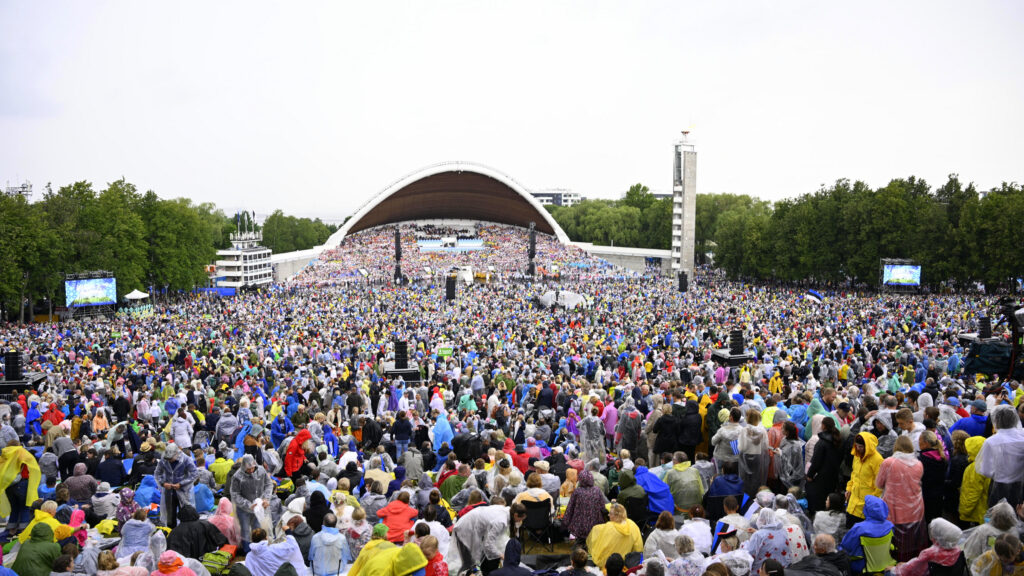Guidelines for Organizing Sustainable Events
Sparked from the European Green Capital year in Tallinn, the Mayor of Tallinn signed the decree establishing Guidelines for Organizing Sustainable Events in April 2023, which includes recommendations for event planners in several categories:
- Materials and Purchases
- Catering and Water Use
- Waste Management
- Transport
- Energy and Resource Efficiency
- Communication and impact on the venue
Since 1st of June 2023, food and drinks may only be served in reusable containers (e.g., plates, bowls, drinking glasses, coffee cups) and using only reusable cutlery (e.g., knives, forks, spoons, chopsticks) in public events hosting up to 30 000 visitors per day in Tallinn. Although the regulation does not apply to the aforementioned events, as there were more than 30 000 visitors, the organisers of these events aimed to prove that it is possible to organise more sustainable mass events. It is no less important that the same ban on single use containers and cutlery at events will take effect for the whole country regardless on number of visitors from 1st January 2024.
Since the Song and Dance Celebration is a festival lasting for several days from morning to evening, sustainable catering for the performers as well as the visitors was no easy task. With the help of Acento, a consulting company for sustainable events, the festival team started to focus on how to organise the event in a more sustainable manner already in 2022.
Everything starts with CE smart procurement
In January 2023, the organisers of the Song and Dance Celebration together with Acento prepared the procurement for reusable tableware and separate waste collection during the event. Eesti Pandipakend won the public procurement for the deposit tableware system and all caterers at this year’s festival used deposit tableware to serve food and drinks. A total of 201 120 deposit tableware items were used by visitors during the event. The participants used 120 000 deposit tableware items during the festival. Compared to the previous festival in 2019, the amount of waste generated was reduced by around 50%. All in all, the deposit tableware system worked very well during the event.
The system sounds simple enough: 1) When buying drinks or food, people pay a 2-euro deposit for the tableware; 2) Once finished, people return the tableware to the collection point and get their deposit back.
However, it is important to remember that good communication is the basis for success, and getting different stakeholders on board will contribute to that success. Several meetings were held with caterers to share detailed information about the deposit system. The communication strategy for the event was carefully planned, and signage and information boards were designed for the public. The number and location of the return stations were carefully considered to make it easy and convenient to hand back the used tableware.
Single-use items are all around us
The organisers of the Depeche Mode and Weeknd concerts took sustainability even further than the deposit system. During such one-off events, everything is put up for this single event and, until now, this has also meant that most of it is single-use. But not in Tallinn! “Any single-use disposable product made of any material affects the environment and does not solve the waste problem,” said Liina Kanarbik from the circular economy department in Tallinn during the webinar. For example, the organiser used reusable banners to cover the fences that provided a barrier for the event. These are most often made from PVC, a material that contains hazardous substances and is also difficult to recycle, so reusing such banners goes a long way in terms of sustainability. Another interesting example of a sustainable mindset in event planning is the stabilisation of the stage. For such huge outdoor stages, water tubs and barrels are used as a ballast solution under the stage. Often these are filled with clean drinking water from the water supply network. During the concerts this summer, the water tubs were filled with the water from a nearby pond at the Song Festival Grounds.
There is a lot to consider when organising events having circular economy in mind, but these examples from Tallinn demonstrate that circular economy practices are already successfully in practice. There is still some way to go towards zero waste events, but we are on the right track.
27.09.2023 | Triin Sakermaa (Tallinn), Triin.Sakermaa@tallinnlv.ee

